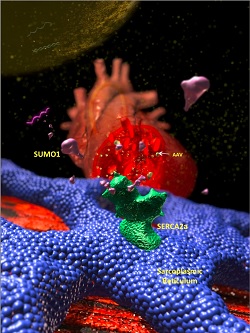 |
| Genes delivered to the heart via viral vectors reverse heart failure.--Courtesy of Mount Sinai |
Researchers at the Icahn School of Medicine at Mount Sinai Hospital used a virus to deliver genes directly to the heart to reverse heart failure, shrinking an enlarged heart and improving its function.
As published in the journal Science Translational Medicine, the scientists published results from a study that showed the delivery of the gene SUMO-1 directly into the heart in animals improved the heart's function by regulating another gene, SERCA2.
Previous clinical studies at the hospital have shown that delivering the gene SERCA2 to the heart in an inert virus via a cardiac catheterization procedure prompted the production of an enzyme that regulates the pumping of calcium out of cells in the heart. In patients with heart failure, SERCA2 does not function, making it necessary for the heart to work harder and grow larger, according to a Mount Sinai report.
And combining the two gene therapies could help regulate heart function even more thoroughly, the study shows. The study tested the delivery of SUMO-1 alone, SERCA2 alone and a combination of the two. Compared to only SERCA2, the delivery of SUMO-1 alone, as well as the combination, resulted in stronger heart contractions, better blood flow and reduced heart volume, according to the report.
"SUMO-1 gene therapy may be one of the first treatments that can actually shrink enlarged hearts and significantly improve a damaged heart's life-sustaining function," lead author Roger J. Hajjar said in a statement. "We are very eager to test this gene therapy in our patients suffering from severe heart failure."
- here's the Mount Sinai report